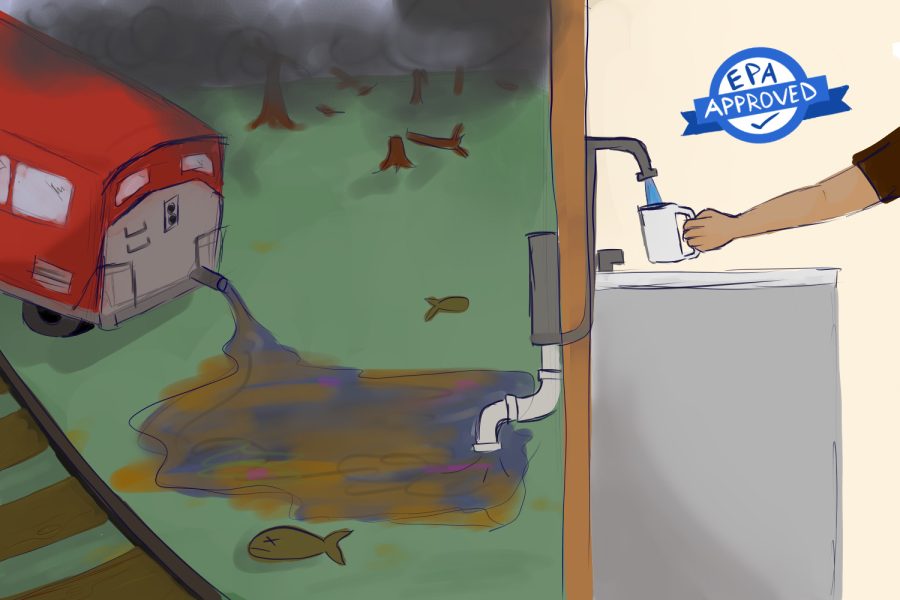Unlike what they state on their website, East Palestine, Ohio, is not the place you want to be.
In light of the East Palestine train derailment, which caused released hazardous chemicals to be released into the area on Feb. 3, the citizens of Ohio have expressed uncertainty. Although the United States Environmental Protection Agency (EPA) has claimed that no concerning levels of chemicals have been detected in the air, water, and soil, the nearby residents tell a different story.
Among many concerns, one of the most important ones is this environmental disaster’s lack of media coverage.
Many large-scale news outlets neglected to inform the public of the train derailment, so citizens were left uncertain of the possible threat to their health.
The train contained multiple chemicals, including vinyl chloride, used for manufacturing plastics dispersed along East Palestine’s surrounding areas. On Feb. 6, Norfolk Southern made the urgent decision to burn the areas affected by the chemicals to regulate the situation. At this time, residents had left the area following an evacuation order that lasted until Feb. 8.
However, the crisis is far from over. Norfolk Southern’s decision to burn the chemicals released phosgene and hydrogen chloride, byproducts of burning vinyl chloride.
The environmental impacts of these chemicals, especially on wildlife, were the first calls for concern. An estimated 3,500 dead fish were reported floating through the nearby rivers by Feb. 13.
But the issues do not stop at the water’s surface; groundwater contamination is a growing worry. According to the EPA, groundwater contamination unfolds over a long period and is difficult to detect. Any chemicals that sunk into the ground after the train derailment may not sound the alarm quite yet, and the true scope of the issue may appear further down the road.
The threat of air contamination is also looming over the residents. Amanda Breshears, who lives 10 miles from East Palestine, told ABC News about her chickens’ death shortly after the chemicals were burned.
“My video camera footage shows my chickens were perfectly fine before they started this burn, and as soon as they started the burn, my chickens slowed down, and they died,” Bershears said.
Vinyl chloride, ethyl acrylate, and butyl acrylate were some of the chemicals carried on the train, to name a few. According to the CDC, symptoms of inhaling or ingesting include dizziness, nausea, headache, and skin allergies, such as rashes.
“The chemical smell was so strong that it made me nauseous,” said resident Amanda Greathouse during an interview with CNN. “I just wanted to quickly pick up what I needed and leave. I only took a few pieces of clothes because even the clothes smelled like chemicals, and I’m afraid to put them on my kids.”
The chemical smell was so strong that it made me nauseous. I just wanted to quickly pick up what I needed and leave. I only took a few pieces of clothes because even the clothes smelled like chemicals, and I’m afraid to put them on my kids.
— Amanda Greathouse, in an interview with CNN
It does not take official testing or a scientific expert to realize that chemical pollution in East Palestine is still prevalent.
“When we left, I had a rash on the skin on my arm, and my eyes were burning for a few days after that,” Greathouse said.
Vinyl chloride, released into the air during the fire, most likely broke down into compounds, including hydrogen chloride and phosgene. Phosgene is widely known for its use as a chemical weapon during World War I, responsible for around 85% of the 91,000 chemical deaths.
Its immediate symptoms are eerily similar to those residents in East Palestine are experiencing: coughing, burning sensation in the throat and eyes, blurred vision, difficulty breathing, nausea, and vomiting.
Furthermore, the National Cancer Institute states that vinyl chloride exposure increases the risk of liver cancer (hepatocellular carcinoma and hepatic angiosarcoma), brain and lung cancers, lymphoma, and leukemia.
The Ohio Department of Health has opened a health clinic to help those with adverse symptoms, but citizens are still hesitant.
“I would go to this clinic in search of answers, but I’m not confident that we would get honest answers,” said resident Ted Murphy in an interview with CBS.
The health risks this train derailment may have exposed residents to cannot be taken lightly. Residents deserve honest and scientific information about their symptoms and the potential causes.
Speculation about significant errors on the part of Norfolk Southern, the train company, has also arisen.
“Norfolk Southern failed to explore all potential courses of action, including some that may have kept the rail line closed longer but could have resulted in a safer overall approach for first responders, residents, and the environment,” wrote Pennsylvania Gov. Josh Shapiro, in a letter Tuesday to Alan Shaw, president, and chief executive of Norfolk Southern.
A Bipartisan Railway Safety Act was proposed on March 2 to “hold companies accountable to prevent terrible tragedies like the Norfolk Southern derailment.” President Joe Biden applauded the bill, encouraging “Republicans and Democrats alike to move quickly to advance these common sense rail safety measures and send him a bill to sign into law.”
Unfortunately, it seems as though history is repeating itself. The East Palestine issue is chillingly comparable to the Hinkley water contamination case from the 1960s. Erin Brockovich previously helped California residents who became ill from their local water supply from the corruption of large-scale corporations. One lawsuit later, she succeeded in suing PG&E for a total of $333 million in favor of the citizens.
Ohio’s governmental decisions mirror that of Hinkley during their crisis: unresponsive and ignorant towards the correlation between the contamination and the residents’ health concerns. Much of the lawsuit dealt with secrecy and PG&E paying for silence or even blatantly claiming the water did not threaten the people.
To assist people in the East Palestine community, those who believe the train derailment and water contamination is a genuine concern, despite what the EPA claimed, should promote the cause and encourage others to learn about it. The lack of media coverage is concerning, after knowing how companies and local governments will put citizens at risk rather than paying the price for their mistakes.
In addition, there must be a call to action for more testing for safety. Services with no relation to the government or the EPA should provide high-quality tests for not only the water but the soil near the burnt area, the dead fish and animals, and contaminated water.
This emergency in Ohio is a warning for people all over the country. Environmental risks, illegal secrecy, and health concerns are constantly overlooked when considering this small town’s scale. However, ignoring the effects that weigh heavily on its residents is impossible. People must continue investigating and searching for answers to protect citizens whose voices have been silenced.
“Please understand that Superman isn’t coming to make everything all better. This will likely get worse before they get better,” Brockovich tweeted. “But East Palestine, you are not alone, and we aren’t going anywhere.”
To hold Norfolk Southern accountable for their actions in East Palestine, sign a petition here: https://www.change.org/p/demand-norfolk-southern-pay-for-toxic-train-derailment?source_location=search
























